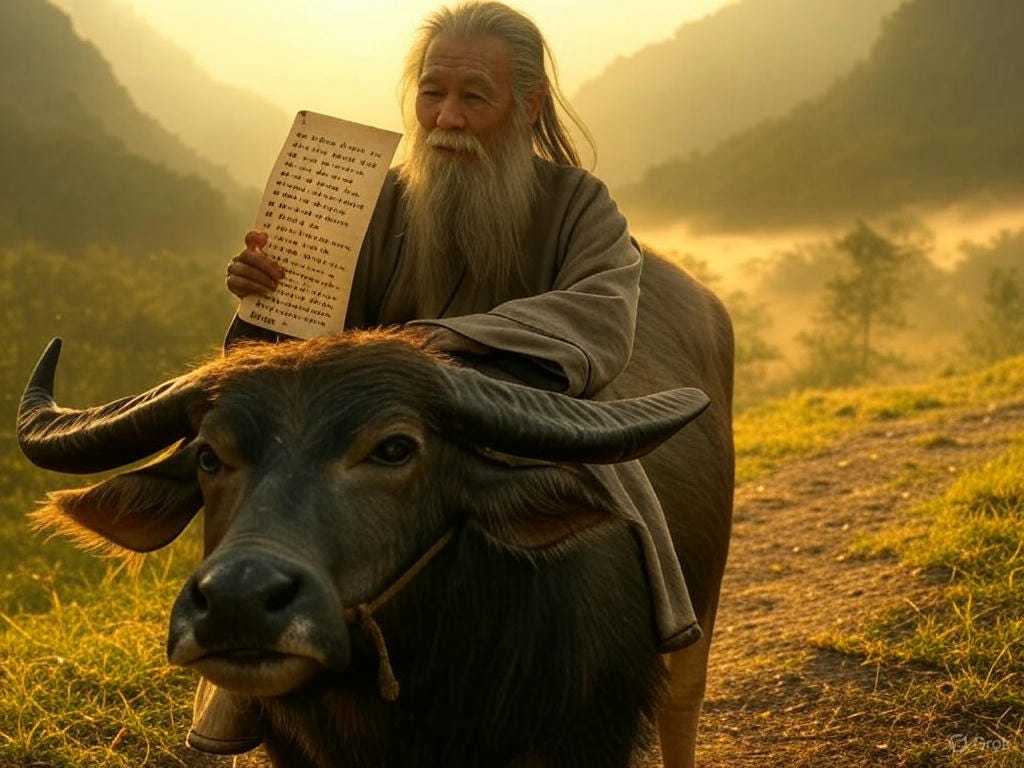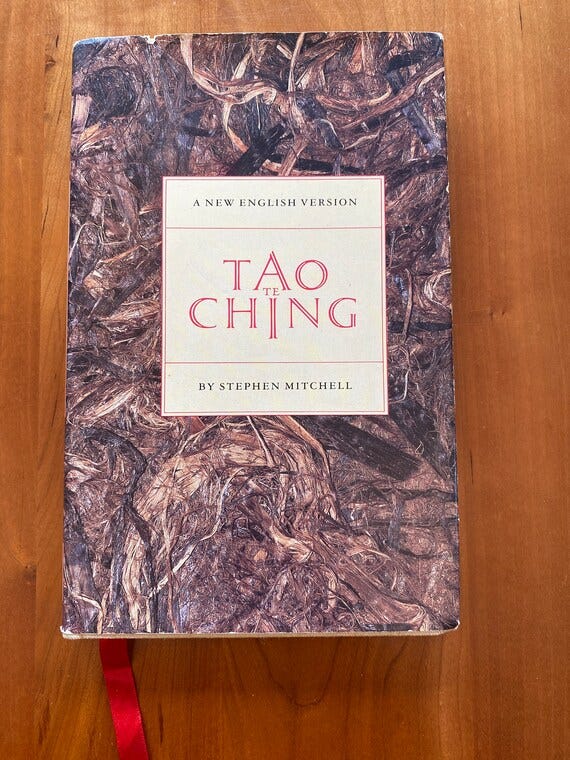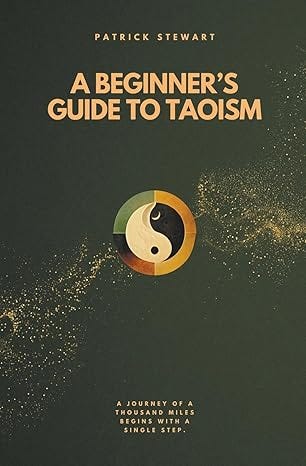New Horizons, Old Words
Reawakening the Way Within
I’ve been reading the Tao Te Ching off and on for over six years now, and like the Bible, I could read it repeatedly for my entire life, but I still don't fully understand everything. On one hand, this is great because I can always return to a small, pocket-sized book on my shelf and read something new. On the other hand, it can be frustrating to feel that I’ve spent hours of meditation and writing to understand this book’s words and come up short. However, one of my favorite phrases (I’ve learned during my Taoism teachings is, “The most Taoist thing you can do is learn everything you can, forget it all, then rediscover it all over again.”
Today, I want to start over. I want to feel like I did six years ago when I discovered an audiobook on YouTube narrated by Stephen Mitchell and began my first deep dive into “the book of the way”, or in it’s native Chinese, Tao Te Ching.
Want to talk to me and other readers? Do you have questions regarding Taoism or life in general? Come chat with me! I’d love to get to you.
History
Tao Te Ching is the seminal collection of writings for the religion called, Taoism. Much like the Bible, it was likely written by many people and collected over the centuries. The legend of it’s creation, however, lives on. The story follows that a wise man named Laozi, who’s Chinese name literally translates to “old master,” was a librarian or records keeper in the imperial court. Having grown tired of war, politics, and the world as it was, he decided to leave his life behind and retire. One night, when he had reached the boarder wall, a guard asked him to spend the night and share his departing wisdom. So, in a small room with nothing but ink and a scroll, Laozi wrote 81 poems. In these poems contains thousands of years of knowledge, wisdom, and love. Those scrolls contained how to lead a nation, live your life in balance with nature, and overcome loss or despair. Laozi, having written 5,000 characters in a single night, climbed on top of a water buffalo and rode off into the morning sun, never to be heard from or seen again.
If you acquire a copy of the Tao Te Ching in Mandarin, remember this is not the original language. Much like English, Mandarin has changed significantly over the last two-thousand years. The oldest known copy of the Tao Te Ching dates back to around 300 BCE and was discovered in 1973 at the Mawangdui archaeological site in Hunan, China. These texts, known as the Mawangdui Silk Texts, consist of two versions, written on silk scrolls. They were found in a tomb sealed in 168 BCE, during the early Han Dynasty, but the texts themselves are believed to have been copied earlier, likely in the late 4th century BCE. This places them roughly two centuries after the traditional attribution of the Tao Te Ching to Laozi, who is said to have lived around 600 BCE, though his historicity is debated.
The Mawangdui versions differ slightly from later editions, notably in chapter order and some wording, and they lack the division into the familiar 81 chapters seen in the standard text. Another significant early copy is the Guodian bamboo slips, discovered in 1993 in Hubei, China, dating to around 300 BCE as well. These slips contain portions of the Tao Te Ching written on bamboo strips, representing about one-third of the text, and are roughly contemporaneous with the Mawangdui finds. Both discoveries push the documented existence of the Tao Te Ching back to the Warring States period (475–221 BCE), making them the earliest physical copies known today.
Unlike the Jesus, it doesn’t matter if the story or even Laozi’s existence, is true. If people were to somehow definitively prove Jesus wasn’t the son of God, then the Bible would become meaningless. Or if we discovered the Bible was created by the Romans, then Jesus’s teachings would become useless. Jesus’ claim that he was the son of God goes hand in hand with believing the Bible’s teachings. With Laozi, because he never claimed to be more than who he already was, the wisdom inside these 81 poems is still true, regardless of who wrote or collected them. The important part are the words, not their author.
I believe Laozi existed and that somewhere, this legend of a man departed this world having summed his entire essence into just 81 chapters. A brilliant, wonderful, person who took his final night with a guard, to lead the way forward for generations.
Personal Relationship
My first copy of the Tao Te Ching was created by Stephen Mitchell. I use the word “created” instead of translated because, in his own words, it is not a direct translation. Instead, Stephen attempted to find the essence of the words and phrase them accordingly. Holding true to the meaning, yet allowing the literalness of the translation to slide. The result is a remarkably beautiful text that, in my opinion, conveys a sense of wonder and emotion which some direct translations sorely lack.
I used to commute to work in those days, and the drive could last 20 minutes. Even in Stephen’s slow, smooth voice, the audiobook can be finished in under two hours. Thousands of years of wisdom in under two hours! To put that in perspective, I’ve spent over 19 hours recording myself explaining the lessons from Taoism and I felt like I hadn’t really started. You can listen to those recordings below.
I listened to Stephen’s recording countless times for months as I dove deep into the calm, relaxed, nature of the Tao. In a life that was a whirlwind of small children, a sick wife, and a long commute, Tao Te Ching became a safe haven; a place to calm my anxieties and let of my fears. I’m no master, and I don’t believe anyone can claim to understand everything, but inside this wonderful collection of 81 poems, I found a way of life that made sense for me. It’s time to go back.
I’ve been away far too long, and it’s time to go home.
As I wrote previously, everything exists in cycles. One leads to the other and back again. We always end where we began. There’s nothing more Taoist than learning a great thought, forgetting all about it, and then rediscovering it all over again. So, over the next few months, or however long this journey lasts, I hope you’ll join me on rediscovering my path with the Tao.
Thank you all for reading today! I don’t paywall my articles on Substack because I believe the wisdom of the Tao shouldn’t be kept from anyone. So, if you want to help support me financially, please consider upgrading to a paid subscription.
A big thank you to my first paid subscriber, Tracy, And my second paid subscriber, Debra!
Want to subscribe? Here’s 20% off just for being awesome!
Or, did you know I self published a book last year that discusses Tao’s reflection on my life and my journey through the hardships of living? You can find it below on Amazon as well as most other online eBook stores.
I’ll write again soon!





